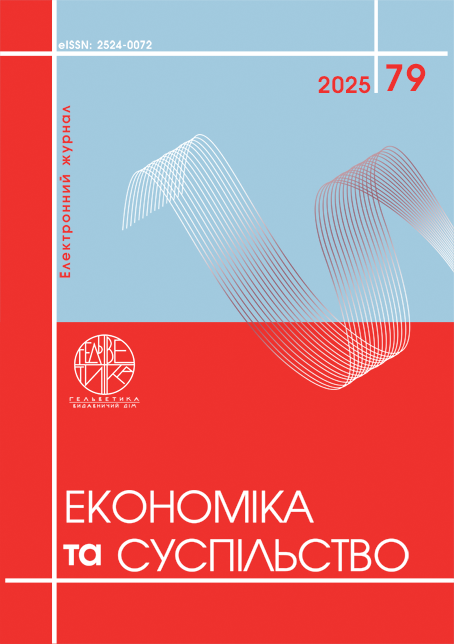PHILOSOPHICAL AND HISTORICAL FOUNDATIONS OF THE DEVELOPMENT OF MANAGEMENT SCHOOLS OF THE TWENTIETH CENTURY
Abstract
The article is devoted to the study of the philosophical and historical foundations of the development of management schools of the twentieth century as the basis of the modern management paradigm. The paper provides a systematic analysis of the main stages in the evolution of management thought — from pragmatism, positivism, and neo-Kantianism at the beginning of the twentieth century to the humanistic and systemic concepts of its later decades. The author reveals the influence of philosophical ideas on the formation of such management schools as scientific management, administrative, human relations, systems, and quantitative approaches. Particular attention is paid to the humanistic turn in the philosophy of management, which marked the transition from mechanistic to anthropocentric models where the main value is the human being as a carrier of knowledge, moral principles, and creative energy. The article argues that the humanization of management contributed to the emergence of a new managerial consciousness, in which rationality is combined with ethical responsibility, and efficiency is complemented by social awareness. The paper explores the dialectics of philosophical ideas that shape modern management paradigms, particularly the synthesis of rationalist and humanistic orientations within the context of the VUCA world. It is established that the integrative philosophy of management unites scientific analysis, cultural values, and moral responsibility, transforming management into a form of spiritual practice. Special attention is given to the Ukrainian dimension of management philosophy, grounded in the traditions of democratic governance, Cossack self-government, and the idea of serving the community. The study shows that Ukrainian management thought combines rationality with moral meaning and interprets leadership as an ethical mission aimed at achieving the common good. The results demonstrate that the philosophical and historical foundations of twentieth-century management remain relevant in the twenty-first century, ensuring the methodological and moral integrity of managerial practice. The article has both theoretical and practical significance, contributing to the formation of a humanistic management culture focused on achieving balance between efficiency, responsibility, and spiritual values.
References
Мельниченко, А. А. Теоретичні засади сучасної філософії управління / А. А. Мельниченко // Вісник НТУУ «КПІ». Філософія. Психологія. Педагогіка. — 2015. — № 1. — С. 57–63. — Режим доступу: https://ktpu.kpi.ua/wp-content/uploads/2016/02/09_Melnychenko.pdf .
Mitsui I. Rebirth of M. P. Follett’s Dynamic Management Thought: From Internet Society to Interweaving Global Community. — Singapore : Springer, 2025. — 108 с. — ISBN 978-981-96-7621-7. — DOI: 10.1007/978-981-96-7621-7. — Режим доступу: https://link.springer.com/book/10.1007/978-981-96-7621-7 .
MEZHEVOV, A., NIKOLAEV, V., MELESHKIN, M. New Approaches to the Management of Organezations in Accordance with the “Vuca - World” Philosophy. WISDOM. — 2022. — Vol. 2, No. 1. — P. 115–121. — DOI: https://doi.org/10.24234/w.v2i1.773 .
Віремейчик, А. М., Патлайчук, О. В., Ступак, О. П. Філософія публічного управління = Philosophy of Public Administration // Гуманітарні студії: педагогіка, психологія, філософія : наук. журн. — Київ : НУБіП України, 2023. — Т. 14, № 2. — С. 164–171. — Режим доступу: https://eir.nuos.edu.ua/items/27d42a71-ef9b-4712-9d5d-3e5e0f4c486e .
Власенко, Ф., Левченюк, Ю., Товмаш, Д., Олексин, І. Філософія управління: освітні смисли і соціальні виклики // Гуманітарний вісник Запорізької державної інженерної академії. Філософія економіки та управління. — 2019. — № 77. — Режим доступу: http://vestnikzgia.com.ua/article/view/177752 .
Jasinska A. Undercover philosophy? Demystifying philosophy programmes taught to managers. — Philosophy of Management, 2025. — [Електронний ресурс]. — Режим доступу: https://www.researchgate.net/publication/391771077_Undercover_philosophy_Demystifying_philosophy_for_management_education .
Philosophy of Management: Ethical Leadership and Organizational Integrity / eds. C. Schlag, D. Bevan. — London : Springer, 2024. — 312 с. — ISBN 978-3-031-57320-2. — DOI: 10.1007/978-3-031-57320-2. — Режим доступу: https://link.springer.com/book/10.1007/978-3-031-57320-2 .
Князєв, В. М., Бакаєв, Ю. В., Василевська, Т. Е. (ред.) Традиції демократичного врядування в історії українського державотворення : монографія. — Київ : НАДУ при Президентові України, 2010. — 220 с. — ISBN 978-966-619-315-5. — Режим доступу: https://files.znu.edu.ua/files/Bibliobooks/Inshi51/0039719.pdf .
Melnychenko, A. A. (2015). Teoretychni zasady suchasnoi filosofiï upravlinnia [Theoretical Principles of Modern Philosophy of Management]. Visnyk NTUU “KPI”. Filosofiia. Psykholohiia. Pedahohika, (1), 57–63. Retrieved from https://ktpu.kpi.ua/wp-content/uploads/2016/02/09_Melnychenko.pdf
Mitsui, I. (2025). Rebirth of M. P. Follett’s Dynamic Management Thought: From Internet Society to Interweaving Global Community. Singapore: Springer. DOI: https://doi.org/10.1007/978-981-96-7621-7
Mezhevov, A., Nikolaev, V., & Meleshkin, M. (2022). New Approaches to the Management of Organizations in Accordance with the “VUCA-World” Philosophy. WISDOM, 2(1), 115–121. DOI: https://doi.org/10.24234/w.v2i1.773
Viremeichyk, A. M., Patlaichuk, O. V., & Stupak, O. P. (2023). Filosofiia publichnoho upravlinnia = Philosophy of Public Administration [Philosophy of Public Administration]. Humanitarnі studii: Pedahohika, Psykholohiia, Filosofiia, 14(2), 164–171. Retrieved from https://eir.nuos.edu.ua/items/27d42a71-ef9b-4712-9d5d-3e5e0f4c486e
Vlasenko, F., Levcheniuk, Yu., Tovmash, D., & Oleksyn, I. (2019). Filosofiia upravlinnia: osvitni smysly i sotsialni vyklyky [Philosophy of Management: Educational Meanings and Social Challenges]. Humanitarnyi Visnyk Zaporizkoi Derzhavnoi Inzhenernoi Akademii. Filosofiia Ekonomiky ta Upravlinnia, (77). Retrieved from http://vestnikzgia.com.ua/article/view/177752
Jasinska, A. (2025). Undercover Philosophy? Demystifying Philosophy Programmes Taught to Managers. Philosophy of Management. Retrieved from https://www.researchgate.net/publication/391771077_Undercover_philosophy_Demystifying_philosophy_for_management_education
Schlag, C., & Bevan, D. (Eds.). (2024). Philosophy of Management: Ethical Leadership and Organizational Integrity. London: Springer. DOI: https://doi.org/10.1007/978-3-031-57320-2
Kniaziev, V. M., Bakaiev, Yu. V., & Vasylevska, T. E. (Eds.). (2010). Tradytsii demokratychnoho vriaduvannia v istorii ukrainskoho derzhavotvorennia [Traditions of Democratic Governance in the History of Ukrainian State-Building]. Kyiv: NADU pry Prezydentovi Ukrainy. Retrieved from https://files.znu.edu.ua/files/Bibliobooks/Inshi51/0039719.pdf

This work is licensed under a Creative Commons Attribution 4.0 International License.


